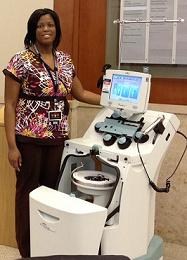Consider taking two hours of your time to donate platelets, and you may save a patient’s life. Platelets are components found in your blood that help it to clot. Cancer patients may need transfusions of platelets because their bone marrow has become too crowded with cancer cells, or their cells become damaged from chemo- and radiotherapy. In addition to cancer patients, organ transplant, trauma victims, and cardiac surgery patients can also benefit from platelet donations. Donated platelets have a shelf-life of five days. Cancer patients need anywhere from two to 100 transfusions of platelets during their treatment, which is why there is a constant need for donations. Here are four tips to remember when donating platelets.

- Eat a healthy meal and drink plenty of fluids the day before and the day of your scheduled donation.
- Wear comfortable clothes. It takes about 1 ½ to 2 hours to donate, so wear clothes that are comfortable.
- Bring something to do. Bring your laptop, magazine or book to keep you occupied while you donate.
- No aspirin or Ibuprofen. Do not take aspirin or ibuprofen at least one day prior to donating.
The Johns Hopkins Blood Donation Center is located on the first floor of the Johns Hopkins Outpatient Center (JHOC) 601 North Caroline Street, Room 1144, Baltimore, Maryland 21287. For more information about donating or to schedule a donation appointment, call 410-955-TIME.
I'd like some recommendations on what constitutes a "healthy meal". I'm assuming people have their favored meal that helps them.
I'm impressed, I have to admit. Seldom do I come across a blog that's equally educative and engaging, and let me tell you, you've hit the nail
on the head. The issue is an issue that too few folks are speaking
intelligently about. Now i'm very happy that I
came across this during my search for something regarding this.
Can I donate platelets if I am taking blood pressure medication?
Many times the body will repair itself and produce more platelets
if given the needed rest from these foods. Even though everything is not known about immune thrombocytopenia, there are enough
factors that have been researched that give
us clues as to the possible cause. I am mainly referring to any platelet
level under 25,000 as acute stage.
While I have been donating platelets for 18 years (and blood for years before) with no physical effects other than a little numbing of the lips and face when the cooler blood is returned to my system, today I developed severe nausea about an hour and twenty minutes into the procedure.
I asked for and received a plastic container for the unthinkable while they stopped the apheresis a few minutes early. The "wave" of nausea hit me and I gagged. After that last return, the nausea left as quickly as it arrived. I will be searching the web looking for a reason. I'm doing the apheresis again in two weeks but do not ever want that to happen again.
I had the same thing happen to me today. Did you find a cause? I don't have a clue what happened.
Thank you for your article.
I personally donate platelets because a) I can find the time in my day and b) you can donate more often than whole blood donations. Unless there is a critical blood supply shortage I feel good about allocating my donation to platelets.
That being said, I think it's worth mentioning that you can "work" up to the whole donation time. It took me quite awhile to work through the nausea for a whole platelet donation. But I was perfectly fine with a half donation. Also, sucking on Tums helped with the tingling in my lips.
It's an odd sensation to donate platelets...but something I'm happy and honored to do.
Comments are closed.